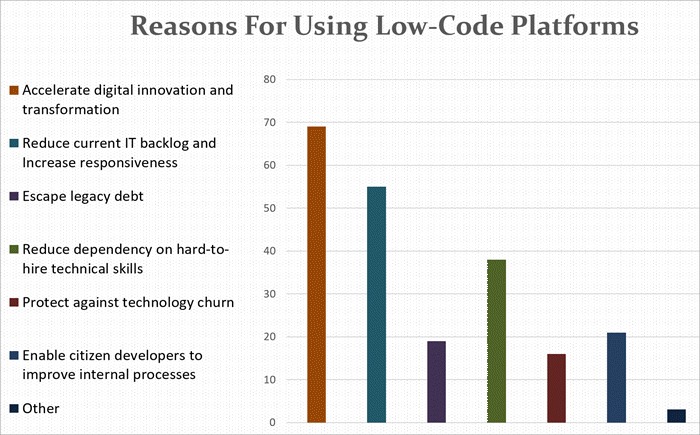
In addition to revolutionizing the approach to software engineering, low-code development raises complicated questions.
Can any professional engage in low-code development, or a certain technical knowledge is still required? Should developers be engaged in low-code development or should they fear losing their jobs?
Let’s discuss in detail why low-code platforms are gaining ground and how the trend influences software product development at the moment.
Why low-code development is a thing
The rise of low-code platforms is not surprising—it’s a natural answer to an internal demand evidenced by an ever-growing backlog of features and apps and a shortage of developers.
Many businesses, particularly smaller ones, have scarce human and financial resources to address all their needs and get on the bandwagon of digital transformation.
Low-code platforms lower the entry barrier by providing an opportunity to use sophisticated technologies with the same budget and team, regardless of the technical knowledge level.
What’s more, low-code apps are delivered much faster than with traditional software development. This very feature has become the main game changer that helped many businesses live through 2020.

When companies had their employees suddenly locked down at home, they needed a solution to continue running their operations and connecting with customers. And they needed it literally overnight. It meant that even if they were ready to develop a custom app, they had no time for that.
In this sense, low-code apps with their drag-and-drop interfaces and pre-built connectors became a viable solution for many businesses. Such businesses included those that had to rebuild their operations to serve customers in new conditions and those that needed to streamline their processes when their services came in high demand, which led to an overwhelming workload (for instance, for those who happened to sell protective gear or antiseptics).
Why tech-savviness is still a must
Low-code development resembles building with LEGO bricks—anyone can do it, or such is a popular opinion. One should only select necessary components and drag and drop blocks within the graphical user interface. In reality, it’s not that simple.
Unsupervised app building with excessive steps and elements can make apps cumbersome and contribute to technical debt. It means that in order to truly harness low-code development platforms, professionals should have a certain degree of tech-savviness, or ideally, a combination of technical skills, deep understanding of business challenges, and domain knowledge.
Low-code development tools target citizen developers, or, in other words, people who have a deep understanding of their industry and a technical-oriented mind but who are more interested in solving business challenges than coding.
In addition to having many ideas, they can also articulate and define requirements and use the technology to solve their problems—they just don’t want to learn a number of coding languages to make their ideas come to life.
Low-code development fills the programming skills gap, covers for developers’ shortage, and can be used both for testing ideas and releasing solutions.
[jwp-video n=”1″]
Does it displace software engineers?
Low-code platforms are frequently seen as a threat to the traditional role of software developers. Indeed, why spend months and a fortune on custom app development when it’s possible to pay a license fee and deliver apps at speed with no coding needed?
It seems that the rise of low-code development tools will somewhat change the role of developers but it won’t endanger their existence. Above all, developers are needed to build and enhance low-code and no-code platforms in the first place.
At the same time, no low-code platform could compete with a custom-built app, particularly, in the long run. So custom app development will stay a primary option for medium and large businesses that require flexibility and wide customization capabilities.
In their turn, low-code apps are great for reacting to various business disruptions or for covering separate non-critical functions. In all other cases, they are quite limited in their functional scope and can’t cover multiple operations cohesively.
When a company that has an in-house IT team plans to adopt a low-code platform, it needs to first get buy-in from software engineers. They should understand that this decision will free them from a good share of minor tasks flowing from different departments and let them focus on more complex projects.
At the same time, it’s never a good idea to make developers work with low-code platforms. They might not get why they should make a million clicks instead of writing a single line of code.
Alternatively, it’s possible to adopt platforms that have both low-code tools and a code editor or allow introducing custom code. Such tools can also be viewed as an extension of programming methods and used for fast experiments and MVPs.
Plus, developers can team up with other employees to supervise their low-coding efforts and educate them about coding and business logic essentials.
Best low-code development platforms in 2021

- Visual LANSA
- GeneXus
- Zoho Creator
- Creatio
- Appian
- KiSSFLOW
- Mendix
- OutSystems
- Salesforce Lightning
- Microsoft PowerApps
- AppSheet
- Google App Maker
- FileMaker
- DWKitSpring Boot
- VINYL
- Ninox Database
On a final note
There are two best use cases for low-code tools. First, they can help small businesses at early stages to adopt innovative solutions fast and affordably. Second, when used to contribute to software engineers’ work, these tools can drive the productivity of developers themselves and the company on the whole.
So instead of creating conflicts or risks for software engineers, low-code tools can lead to win-win outcomes for all the parties.




